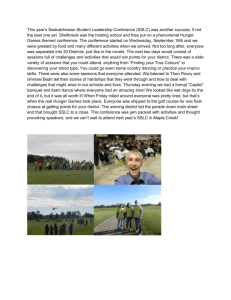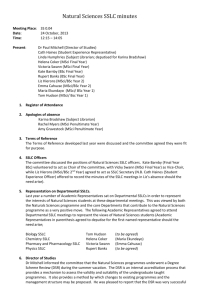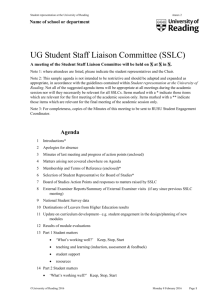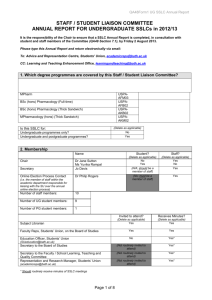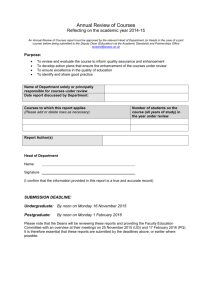ANNUAL REPORT FOR UNDERGRADUATE SSLCs in 2012/13
advertisement
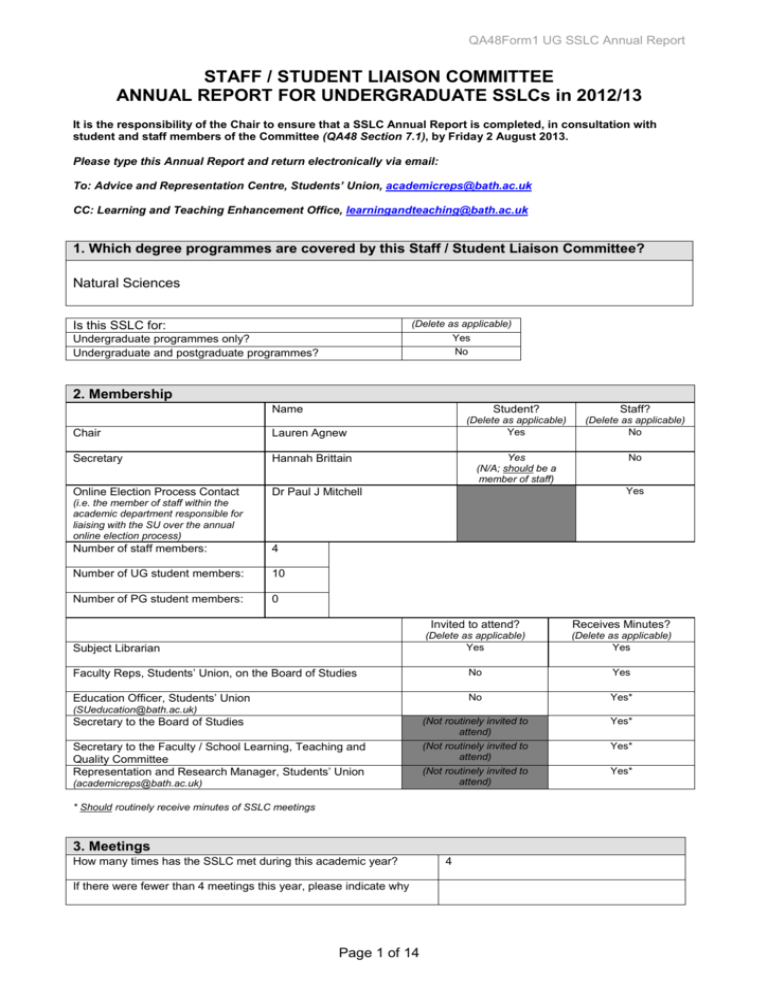
QA48Form1 UG SSLC Annual Report STAFF / STUDENT LIAISON COMMITTEE ANNUAL REPORT FOR UNDERGRADUATE SSLCs in 2012/13 It is the responsibility of the Chair to ensure that a SSLC Annual Report is completed, in consultation with student and staff members of the Committee (QA48 Section 7.1), by Friday 2 August 2013. Please type this Annual Report and return electronically via email: To: Advice and Representation Centre, Students’ Union, academicreps@bath.ac.uk CC: Learning and Teaching Enhancement Office, learningandteaching@bath.ac.uk 1. Which degree programmes are covered by this Staff / Student Liaison Committee? Natural Sciences (Delete as applicable) Yes No Is this SSLC for: Undergraduate programmes only? Undergraduate and postgraduate programmes? 2. Membership Name Chair Lauren Agnew Secretary Hannah Brittain Online Election Process Contact Dr Paul J Mitchell Student? Staff? (Delete as applicable) Yes (Delete as applicable) No Yes (N/A; should be a member of staff) No Yes (i.e. the member of staff within the academic department responsible for liaising with the SU over the annual online election process) Number of staff members: 4 Number of UG student members: 10 Number of PG student members: 0 Invited to attend? Receives Minutes? (Delete as applicable) Yes (Delete as applicable) Yes Faculty Reps, Students’ Union, on the Board of Studies No Yes Education Officer, Students’ Union No Yes* (Not routinely invited to attend) (Not routinely invited to attend) (Not routinely invited to attend) Yes* Subject Librarian (SUeducation@bath.ac.uk) Secretary to the Board of Studies Secretary to the Faculty / School Learning, Teaching and Quality Committee Representation and Research Manager, Students’ Union (academicreps@bath.ac.uk) * Should routinely receive minutes of SSLC meetings 3. Meetings How many times has the SSLC met during this academic year? If there were fewer than 4 meetings this year, please indicate why Page 1 of 14 4 Yes* Yes* 4. Items, Issues and Good Practice This table is to record key issues and topics. These will be used to inform an institutional-wide report from the Students’ Union detailing items that both the University and Students’ Union should consider in 2013/14. Example areas (this is not a comprehensive list of topics covered; feel free to add details of others issues covered by your SSLC) Last year’s SSLC Annual Report Programme content and delivery (but not individual lecturers), changes to existing units / programmes and proposals for new units / programmes Record key items discussed The report was looked at during the first SSLC, no issues were raised. Some students majoring in Physics had become confused about whether or not they were required to produce a placement poster, as students taking a Physics degree were not required to do so. Some 2nd years taking the Maths for Scientists 3 module had complained that applied examples had all been Physics based, and that they were difficult to follow for those who had no background in Physics. Any example(s) of Good Practice Any action taken The DoS made it clear that all Natural Scientists undertaking placement were required to produce a poster, regardless of major subject, which should have been made clear on Moodle and in placement information packs. It was, however, noted that the module is run by the Physics department and taught by a Physics lecturer, and that the details of the examples would not be part of the examination material, but just to show a possible application of the methods used in lectures to aid understanding. Some 2nd years without a Physics tutor had complained that they were not receiving as much support and help with their physics project as those who did have a Physics tutor. A solution to this was for students to ask their lecturer for help instead. Some 1st year students complained that the material in the PA10237 tutorials preceded the taught material, which made them difficult to follow. The DoS followed up the matter with the course convenor. Some students were enrolled on up to 11 previous modules on Moodle, for which they no longer required access. For some reason, they could not un-enrol themselves from these modules through Samis, which was leading to unwanted emails. The DoS followed up this issue. Page 2 of 14 The problem was put down to glitches in SamisMoodle communications. Students taking Chemistry major had complained that they had spent a lot more time on their project, on average, than students taking Physics major. Physics had scheduled lab time, where Chemistry had not, the result of this being that Chemistry major students had spent a lot more time in the lab. It was also noted that Chemistry major NS students would only receive 12 credits for completing a similar workload to Biology students, who would receive 18 credits. The DoS noted that there will always be differences between departments, and that any issues might be better to be mentioned at the relevant SSLCs (i.e. Chemistry in this case). The problem is that all Natural Science students should be doing the same amount of credits (12 credits) so it is uncertain what changes should be made. Dr Paul Snow noted that it is important to set proper expectations of Natural Science students at the start; i.e., what is the genuine difference going to be compared to other programmes. Natural Scientists taking Biology final year projects were unhappy with the limited feedback they received compared to home Biology students. They were also unsure which marks were theirs on the document they received, which caused some frustration. This information was passed on to the Biology department. Students taking the Pharmacology unit PA30266 (Pharmacology of Infection and Immunity) experienced major issues with communication in 2nd semester. The unit had 39 lecturers on Moodle, and not all of these were involved in the unit at the time. The main problem with the unit is that students enrolled on it were not being told what was happening, and felt ignored. The DoS has since followed this up with Dr Phillip Rogers (DoT, Pharmacy and Pharmacology). BB30156 was formally reintroduced into the NS programme for 2nd semester of 2012/13, after it was reintroduced into the Biology programme only, and several Natural Scientists showed interest in taking the module. Page 3 of 14 New streams for 2013/14: 1. Biochemistry (BSc/MSci) This must be started in 1st year. Forbidden combination with Pharmacology, but DOS hopes to change this in the next few years. 2. Social Sciences (BSc) Under the same category as Languages, Psychology, Education and Management, so incompatible with these, but this may change in future years. A number of Biology units are changing (retirement reasons, etc.): e.g. Mike Mogie is retiring, so removal of BB30072 (Biology as a World View) will leave a gap in 1st semester of 3rd year, which will be replaced by next year with another unit. For the MSci Biology Stream, lecturers for 2nd semester units BB40117 (Microbial Evolution) and BB40141 Molecular biology of microbial adaptation are leaving. It is most likely that replacement lecturers will be found in time for 2nd semester next year. A few more changes have been proposed and are under discussion. Compulsory lab units for students majoring in Physics and a new 3rd year unit will be added in 2013/14 (Fluid Dynamics and Laser Physics). It was decided that PH10007 (Mathematics for Scientists 1) and PH10008 (Mathematics for Scientists 2) work well, but year 2 maths is harder/ less relevant to the NS course in general. Dr Paul Snow said that perhaps the Physics department should work to find a solution to help people struggling with the general concepts of these units. It was also suggested that a 6 credit statistics module be put in the place of Mathematics for Scientists 3 in semester 1 of 2nd year, leading onto Modelling the Dynamics of life, for students taking biology and/or pharmacology. The aim of this would be to give students a better grounding in the Page 4 of 14 knowledge and use of statistical techniques than un-assessed Key Skills workshops and MASH would do, as they are more than likely to require using statistics at some stage in their programme, and also to allow for other 2nd year options in Mathematics which are less Physicsbased, which would help with this issue. Some environmental units will be changing around for 2013/14. Currently, for 2nd Year Environmental Stream, Semester 1 is XX20085 (Earth as an Ecosystem: 100% exam) and Semester 2 is XX20001 (Renewable Energy: 25% coursework, 75% exam). Next year, Semester 1 will be XX20001 (Renewable Energy: 25% coursework, 75% exam) and Semester 2 will be XX30191 (Energy and Environment: 20% coursework, 80% exam). Year 3 units will also be slightly different to previous years. Information to support students in making informed Unit choices Students studying MA20220 (ODEs and Control), MA30047 (Mathematical Biology 1) and/ or MA30063 (Mathematical Biology 2) had complained that the prerequisites to these modules were not available to Natural Scientists. The DoS discussed these issues with the unit convenors and arranged for this year’s students to enrol onto alternative modules. It was noted that students taking CH30086 (Inorganic Chemistry in Biological Systems) may not have any pre-requisite knowledge of Biological Systems post GSCE level, and so may struggle with certain aspects of the unit. Students having this issue were advised to speak with their lecturer. Page 5 of 14 Timetabling In 2nd year, Maths for Scientists 3 and Cognitive Psychology clashed in semester 1. Some final year and 2nd year students complained about clashing deadlines towards the end of 2nd semester. Group work No discussion. Assessment and Feedback, including examinations (if applicable) Installation of a suggestions box and SSLC information outside the 3S office was suggested by a student who had noticed that this had been implemented by the departments of Chemical Engineering and Electrical Engineering. It was thought that it might make it easier to contact the SSLC with any queries or complaints about the NS programme. Panopto was suggested as a solution, but as not all lecturers would be happy to record lectures in such a way, the best suggestion was for students taking both of these modules to attend lectures bi-weekly and catch up on the ones they missed by asking a friend to lend them their notes, and/or speaking to the lecturer to discuss any issues they may be having. The DoS highlighted that the flexible nature of the course makes it difficult to avoid clashes completely. The DoS said that the deadlines are made clear at the beginning of the semester to give students time to foresee possible problems with clashes and react accordingly by informing their tutor and/or lecturers. The DoS suggested that this might result in more non-constructive than constructive feedback from students due to its anonymous nature. There was a suggestion to publish SSLC discussions from the quarterly meetings online; on a blog page, Twitter, Facebook, or similar; with the aim of helping communication between the SSLC and the rest of the student body. The Genetics MCQ was sat in March, and results were still not back at end of April, which was past the 5 week deadline. This is one example of the issue of formative feedback which surpasses the deadlines put in place. Page 6 of 14 It was instead suggested that the notice board outside 3S would be used to provide the contact information of the academic reps and to post the bi-semesterly minutes so students could see what had been discussed previously. The generic degree classification criteria list was discussed in the last SSLC meeting. The general consensus was that whilst this could be used as guideline for marking work, there were some formats of assessment which it might not be compatible with, i.e. the first class criteria ‘extensive evidence of wide research and reading beyond the material presented by the lecturers’ cannot be applied to subjects such as maths which rely on practice of technique rather than reading beyond the lecture material. This is similar with MCQs in any subject, as these do not present students with an opportunity to present their knowledge gained through further reading. The DoS asked the SSLC if they thought that the use of TurnItIn at the University was acceptable. The general consensus was that it was used well, and that whilst accidental plagiarism was always a worry when writing pieces of work, incidences of it actually happening were very low. Feedback Policy A section of the QA16 (Quality Assurance Code of Practice: Assessment, Marking and Feedback) document, regarding the requirement of units to provide at least one formative assessment and feedback opportunity, was mentioned in an academic council meeting: “Formative feedback – 5.5 Accordingly, there is a requirement that every unit should include at least one formative assessment and feedback opportunity, subject to a waiver for individual units where approved by the relevant Associate Dean/ Assistant Dean/ Head of Learning Partnerships on the advice of the relevant School/ Department Learning, Teaching and Quality Committee, and after Page 7 of 14 This issue was further discussed as part of the feedback campaign run by the SU, as it was not only a departmental issue, but across every faculty within the University. consultation with students. In units where the summative assessment regime comprises more than one item of assessment, the earlier piece(s) of summative assessment may fulfil this expectation.” Survey results (e.g. NSS, Unit & Programme Evaluations) External Examiners Reports and University response Skills development and training It was agreed that the units run by the NS department were good at doing this; however, other departments did not do this so well, if at all. Overall, it was felt that there was a lack of parity across the units available in the NS department, mostly because the majority of units are run by different departments, and there is a lack of parity between how they do things. Two main points were raised from the online unit evaluation discussion, held in April. Firstly, that it would be useful to be able to see the comments from the units which are part of the NS programme, as these are meant to be discussed in SSLC meetings. Secondly, the timing of the release of feedback forms should be altered to optimise the number of people who fill them out; currently they are sent too early (up to 4 weeks before lectures are over). No discussion. Some students accidentally attended the Endnote and Web of Knowledge key skills session after being enrolled onto Chemistry Workshops on Moodle, which included this session, and they found it to be useful. Page 8 of 14 Another session was scheduled later in semester 1 for final year students. In 2nd semester, a range of key skills sessions were scheduled, which contributed to the Bath Award as well as aiming to increase employability. These included interview techniques, how to write a professional CV, an introduction to psychometric testing and making successful applications. It was suggested that some students may have benefitted from employability skills sessions earlier on in the academic year than 2nd semester, particularly as graduate schemes tend to ask for applications early on in 1st semester. The DoS reminded the SSLC that there are university wide lectures on writing skills. The English Department helps students with things like dissertation, essay and report writing. Student support (including progress monitoring and the Personal Tutor system) Some students had informed their academic rep that they did not know who their tutor was. The DoS said that any student finding themselves in this position should speak to him. Students majoring in Physics had their tutorials changed to fortnightly. It was also noted that students majoring in Chemistry who were also taking double Physics streams had a Physics tutor. This year, the NS department worked to try and change tutorials from a pastoral format to a more academic format to help students with their academic studies. Library provision (Was the Subject Librarian invited to attend to discuss relevant issues? - Yes) Changes to the library catalogue: addition of books to the search function, ability to filter by year, organise search results through the use of ‘my collection’ and use the catalogue without logging in. Karina Bradshaw (subject librarian) reported that library staff had received positive feedback about these changes from the student body. Referencing guides provided by the library were discussed. It was concluded that the best way to get referencing ‘right’ is through consistency in each individual piece of work, and also by asking your lecturer/course convenor what they expect from you in terms of style. Page 9 of 14 This was taken into account for future years. Some students had complained about not being able to locate and/or gain access to certain journals through the library catalogue and other catalogues, including Scorpus and Web of Knowledge. These were reported to the library staff with the aim of improving the search function on the library catalogue. Library questionnaire Karina asked the SSLC members to promote the library questionnaire to fellow students so that the library staff could improve the services further from any feedback received. If students were still having difficulties, Karina suggested that they ask a member of the library staff to find and/or gain access to any journals they were finding it hard to access The introduction on online methods of payment for paying fines was discussed, and the general consensus was that this was a great idea. IT and / or e-Learning provision (Was a member of Online top up of library card balances. Introducing a method of topping up library card balances online for printing was also discussed as a future possibility. Karina followed up this issue and found some complications with the printing services provider, Canon. However, it is still under discussion for future years, providing that these issues can be solved. Students complained about access to Eduroam and poor signals in certain places within the library and around campus. Some suggestions to the cause behind the problem were that people had been using the space for watching Youtube videos which slowed down the Eduroam connection, and also that people had been using their mobile phone Wifi hotspots to connect to the internet, which had interrupted the Eduroam connection. With multiple issues affecting the connection, this is an issue which is still under discussion, and possible solutions are being looked into. It was highlighted that there are many broken/partly broken computers within the library and around campus, and that many students might not be aware of how and/or where to report such an issue. Karina said that the BUCS desk should be notified of the problem, and that each individual computer could be identified by a number on the side so that they can locate it easily. No discussion. the relevant team invited to attend to discuss relevant issues? - No) Other academic resources (teaching accommodation, research facilities and electronic resources) 3S student study area development. Cath Haines requested student input for the development of this project. Page 10 of 14 Careers provision (Was a No discussion. representative of the Careers Service invited to attend to discuss relevant issues? - No) Other issues or SSLC initiatives (if the SSLC covers both UG and PG students, include, for example, supervisory arrangements [but not individual supervisors] and research training) This year, Lauren Agnew (Chair) volunteered to represent placement students via email. Later on in the year, it was directed by the SU Education Officer (Alex Pool) that in future years each department should have a placements rep who is on placement. This was discussed in the last SSLC meeting of the academic year and it was unanimously agreed that it would cause more issues than it would provide benefits, explained below; 1. Physical attendance at SSLCs would be difficult. 2. If placement reps took part in SSLCs and academic and faculty councils through the media of Skype, employers might not be willing to give them time off for this. It was suggested that the ideal placements rep should be a 4th or 5th year student who had been on placement before, and so could relate to issues experienced by those on placement. However, it was also noted that there would not be an exclusion of placement issues if there was not a placements rep; i.e. these would still be discussed at SSLC meetings. 3. Placements are run by different departments, so any issues with placement should probably be taken up by those departments as each placement is unique to individual students, unlike most units within the Natural Sciences programme. 4. Many issues students face on placement are personal and are not to do with their programme, so these are perhaps better discussed with personal tutors. The general consensus was that while the SSLC could benefit from having a placements rep to be in regular contact with students on placement, there was no particular benefit from this person being on placement themselves. Attendance at other SSLC meetings. Due to the interdepartmental nature of the NS programme and the obvious issues in communication between departments, it was decided that a representative should attend other SSLCs of their major subject to further represent Natural Scientists. Page 11 of 14 This year’s reps were as follows: Caroline Allison: Physics Victoria Swann: Pharmacy and Pharmacology Lauren Agnew: Chemistry Josie Carmichael: Biology Currently, the only consistency in the SSLC between different academic years is staff members; the student body is usually completely new every year. New reps have to learn how SSLC procedures work and will be less aware of previous issues dealt with at SSLC meetings. This affects the consistency and smoothness of how the SSLC is run. It was suggested instead that students could sign up to be an academic rep in 1st year and carry on in this post until their final year. This would produce less voting effort, more efficiency, and more familiarity. At the final SSLC meeting students would be asked if they are happy to stay on for the next year; students could choose to step down at the end of any given academic year if they want to. Elections would then only be held when a vacant position appears due to a student deciding to step down or reaching their final year. Natural Sciences SSLC terms of reference and membership It was agreed that this would be a good idea for future academic years and would be followed up by the DoS. These were discussed in great detail, with the aim of altering the membership to the benefit of future academic years’ students. Page 12 of 14 The proposed changes to the document for the next academic year are highlighted below this table. Proposed changes to the Natural Sciences SSLC terms of reference and membership: Terms of reference The last section of the first paragraph (‘the Chair of the Programmes Committee... passed onto the Students’ Union) needs to be checked by the Head of the Science Faculty as it may be outdated. DoS will follow this up. The final paragraph should be changed to read ‘The SSLC is responsible for selecting up to four students from the Natural Sciences programmes to sit on the Natural Sciences Programmes Committee, to include a final year representative who will normally be the Chair of the SSLC.’ Addition to terms of reference: ‘Natural Sciences representatives should have the opportunity to attend core subject meetings (Biology and Biochemistry, Chemistry, Pharmacy and Pharmacology, and Physics SSLCs) to better represent the cross-faculty division of students. Membership This was highlighted as a problem in previous SSLCs, and so a table of all the possible titles students might come under for each year of taught material in order to make a better selection for membership of the SSLC was produced (the 4th column was a result of the discussion, with points made during the decision making process described below the table). Year of taught material 1 2 3 4 Course BSc BSc with placement MSci MSci with placement BSc BSc with placement MSci MSci with placement BSc BSc with placement MSci MSci with placement MSci MSci with placement Year of study 1 1 1 1 2 2 2 2 3 4 3 4 4 5 SSLC members Up to 2 members Up to 2 members Up to 2 members Up to 2 members Up to 2 members It was agreed that: Students will represent fellow students in the same year of taught material, as opposed to the same year of study. There is no need to differentiate between BSc and MSci students, or between placement and nonplacement students, in the 1st and 2nd years of taught material, as these do little to affect module choices and students have the option to change these aspects of their course up to 2nd year anyway. Students on placement will be represented by the Chair of the SSLC. The position of secretary will be added to ‘Student representatives’, beneath the section about the Chair: ‘Secretary: Chosen from all SSLC members during the first meeting of the academic year – Staff and students (any year) are eligible but normally the Secretary is chosen from the Final Year representatives.’ The ‘Student experience officer’ will be added to the ‘in attendance’ section. 5. Unresolved issues Which of the issues discussed during this year remain unresolved and what steps are being taken to resolve them? Online library card top-ups: Karina Bradshaw is in discussion with Canon to see if this is a possibility. 3S student study area development: this was discussed at an SSLC meeting and all feedback was taken into account to the project’s development. Funding was granted and the project was hoped to be finished in time for revision for 2nd semester exams, but was unfortunately delayed. It is hoped that the study area should be available for use at the start of the 2013/14 academic year, and will provide a good space for group or single study. Page 13 of 14 6. Online election process contact for 2013/14 Who will be the Online Election Process Contact for the academic department? (i.e. the member of staff within the academic department responsible for liaising with the Students’ Union over the annual online election process to promote and to market the online election process for student representatives) Name: Dr Paul J Mitchell Email: P.J.Mitchell@bath.ac.uk Ext.: 6917 7. Authorisation It is the responsibility of the Chair to ensure that a SSLC Annual Report is completed, in consultation with student and staff members of the Committee (QA48: Section 7.1). Chair of the SSLC Signature: Print Name: Date: In the absence of the Chair, the Annual Report may be signed-off by the Director of Studies or Secretary of the SSLC Signature: Print Name: P.J. Mitchell Date: 10/9/2013 When you have completed this form, please return via email by Friday 2 August 2013: To: Advice and Representation Centre, Students’ Union, academicreps@bath.ac.uk CC: Learning and Teaching Enhancement Office, learningandteaching@bath.ac.uk The form should be returned by this deadline even if you have further meetings scheduled in the current academic year; the draft form should, where possible, be circulated to members of the SSLC for comment by email. The Secretary should keep a copy for departmental records AND place on the agenda for the first meeting of the SSLC in the new academic year. Page 14 of 14
